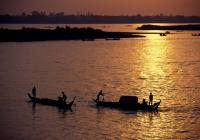MacArthur grant supports new model of ecosystem dynamics
June 28, 2012
The MacArthur Foundation recently approved a $500,000 grant to support improving the scientific understanding of water and fisheries resource use in the Tonle Sap region of Cambodia. CHANS-Net member Les Kaufman, lead PI and Boston University professor of biology, sees the grant enhancing the growing study of coupled human and natural systems (CHANS).

“Our MacArthur project will help to build the science of CHANS at Boston University,” said Kaufman. “CHANS is the interdisciplinary study of the relationship between people and nature that shapes the human condition. In essence, CHANS is the science of sustainability, of humanity’s future in a world that we ourselves are rapidly changing through overpopulation, habitat destruction, pollution, and climate change.”
Kaufman’s co-PI for the Cambodia project is Andy Rosenberg, chief scientist at Conservation International. Other partners include CHANS-Net member Steve Gaines of the University of California-Santa Barbara and Mary Ruckelshaus of Stanford University.
The project focuses on Tonle Sap Lake in Cambodia, a “pulse system” that expands and recedes each year according to seasonal water flows from the Mekong River. The expanded lake floods forests and croplands, transferring massive amounts of terrestrially derived nutrients to the aquatic community, which then later returns the favor. The pulse system supports the freshwater fish that in turn provide 75 percent of total animal protein intake in Cambodia.
Kaufman and his team will focus particularly on the impacts of dam construction and climate change on food security and biodiversity. The goal of the project is developing a new modeling platform to visualize the dynamics of ecosystem service provisioning and trade-offs as the people of the basin face new challenges due to burgeoning demands for fish protein, clean fresh water, agricultural products, and hydropower, and climate change. In other words, the project will enable planners and policy makers to predict the ecological consequences of various policy options before them.
According to Kaufman, the result will be “a comprehensive analytical platform for assessment of ecosystem service dynamics applicable to Tonle Sap and the lower Mekong system, as well as other geographies.”







